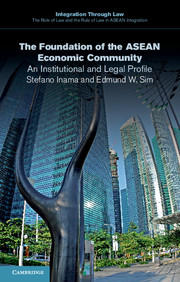2 - Overview of ASEAN
Published online by Cambridge University Press: 05 May 2015
Summary
In order to appreciate both the progress of ASEAN and the additional work required for the AEC, a brief review of the regional bloc's origins and foundations is necessary.
Back to the origin: the foundations of ASEAN
ASEAN was founded by Indonesia, Malaysia, the Philippines, Singapore, and Thailand in the Bangkok Declaration of August 8, 1967. That ASEAN was established by a simple declaration and that the ASEAN Secretariat was only established in 1976, almost ten years after the establishment of ASEAN, provide the first insight of the informal ASEAN way that was deliberately embraced since its beginning.
The Bangkok Declaration, it should be remembered, was primarily a political document to express the region's solidarity in the aftermath of Indonesia's Konfrontasi with Malaysia, the rise of Suharto in Indonesia, Singapore's separation from Malaysia and the continuing war in Indochina. Furthermore, previous regional efforts in post-World War II Southeast Asia had failed (indeed, the Japanese Greater Co-Prosperity Sphere of World War II was perhaps the only time that all of Southeast Asia was under common de facto control, albeit military control that only lasted four years). The Malphilindo proposal was based largely on ethnic ties in the Malay community and could not overcome the political realities on the ground e.g., Sukarno's determination to “crush Malaysia.” Meanwhile, the Southeast Asia Treaty Organization (SEATO) was immobilized in the Indochina conflict due to a lack of consensus and itself having a lack of political credibility as its operations were driven by the USA and postcolonial powers. With the Cold War overhanging Southeast Asia, economic considerations were of secondary importance in the Bangkok Declaration, listed after other priorities:
3. To promote active collaboration and mutual assistance on matters of common interest in the economic, social, cultural, technical, scientific and administrative fields;
4. To provide assistance to each other in the form of training and research facilities in the educational, professional, technical and administrative spheres;
- Type
- Chapter
- Information
- The Foundation of the ASEAN Economic CommunityAn Institutional and Legal Profile, pp. 19 - 35Publisher: Cambridge University PressPrint publication year: 2015

